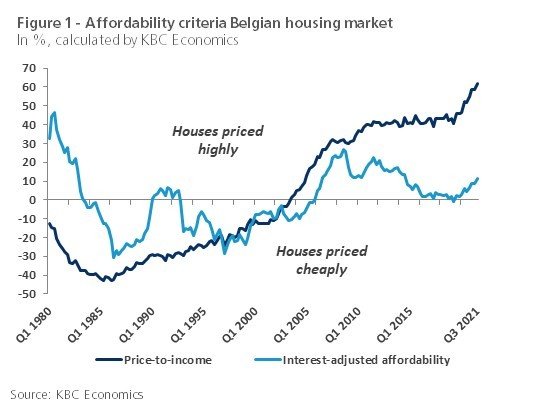Cooldown of a 40 year constant growing market
Belgium's housing market is facing a significant shake-up as interest rates experience an upward trajectory, marking a departure from the prolonged period of historically low borrowing costs. This rise in interest rates, driven by various economic factors, is poised to have far-reaching consequences for homebuyers, homeowners, and the broader real estate sector.

The surge in interest rates in Belgium can be attributed to several factors, including global economic trends, inflationary pressures, and shifts in monetary policy. Central banks, including the European Central Bank (ECB), have signaled a pivot towards tighter monetary policies to combat rising inflation, leading to increases in benchmark interest rates. For prospective homebuyers, higher interest rates translate into increased borrowing costs, potentially dampening affordability and reducing purchasing power. As mortgage rates rise, monthly repayments on loans escalate, making homeownership less attainable for first-time buyers and potentially prompting existing homeowners to rethink their housing decisions.
Moreover, rising interest rates may lead to a slowdown in housing market activity, as buyers become more cautious amidst uncertainty about future borrowing costs. This could result in a decrease in property transactions and a cooling of price growth, particularly in areas where prices have surged in recent years.
For existing homeowners with variable-rate mortgages, the rise in interest rates poses a financial challenge, as monthly mortgage payments increase. While some homeowners may be able to absorb these higher costs, others may face difficulties, especially if their incomes do not keep pace with rising expenses.
Furthermore, the real estate sector, which has been a significant driver of economic growth in Belgium, may experience a slowdown in construction activity and investment. Higher borrowing costs could deter developers from initiating new projects, leading to a potential mismatch between supply and demand in the housing market.

In response to these challenges, policymakers and stakeholders in Belgium's housing market may need to reassess their strategies and adapt to the new interest rate environment. This could involve measures to promote affordability, such as targeted subsidies or incentives for first-time buyers, as well as initiatives to support the construction of affordable housing.
The rise in interest rates in Belgium is poised to have significant ramifications for the housing market, impacting affordability, market activity, and the broader economy. As stakeholders navigate this evolving landscape, proactive measures will be essential to ensure a resilient and sustainable housing sector that meets the needs of both buyers and sellers in the years ahead.
Buying a house in Belgium could be a lot cheaper in the following years…
Sincerely,
Pele23
